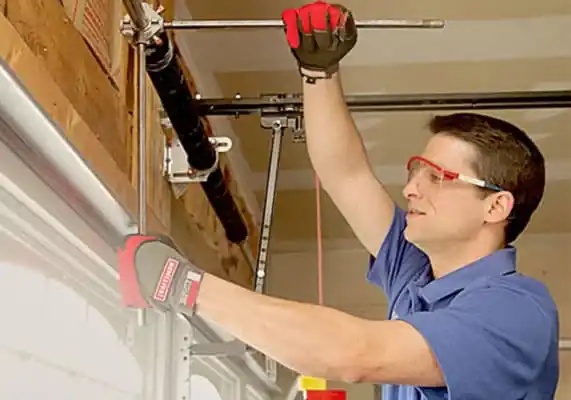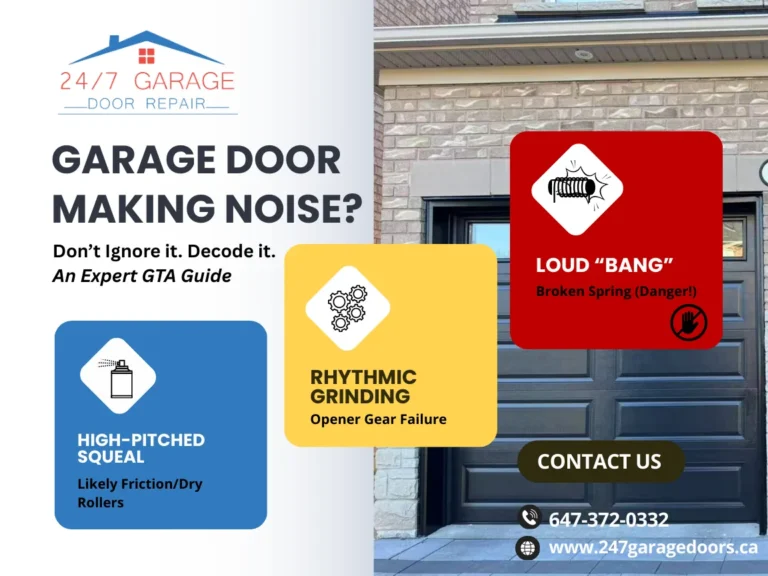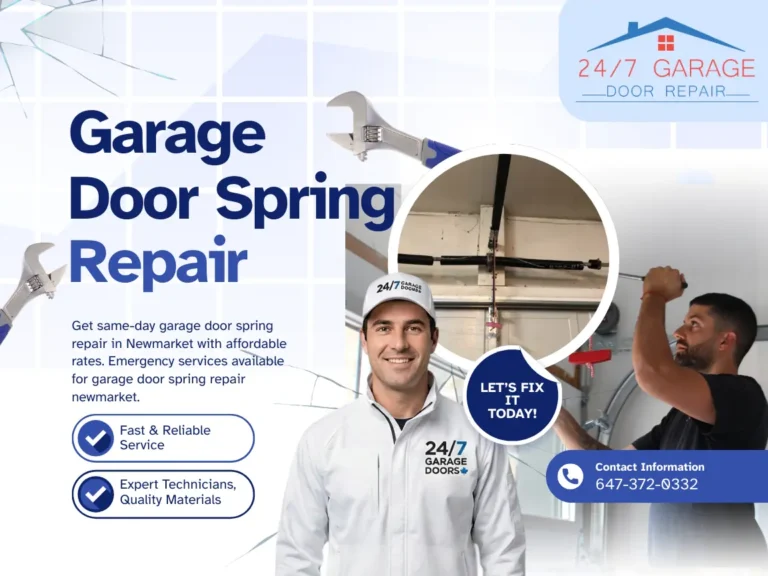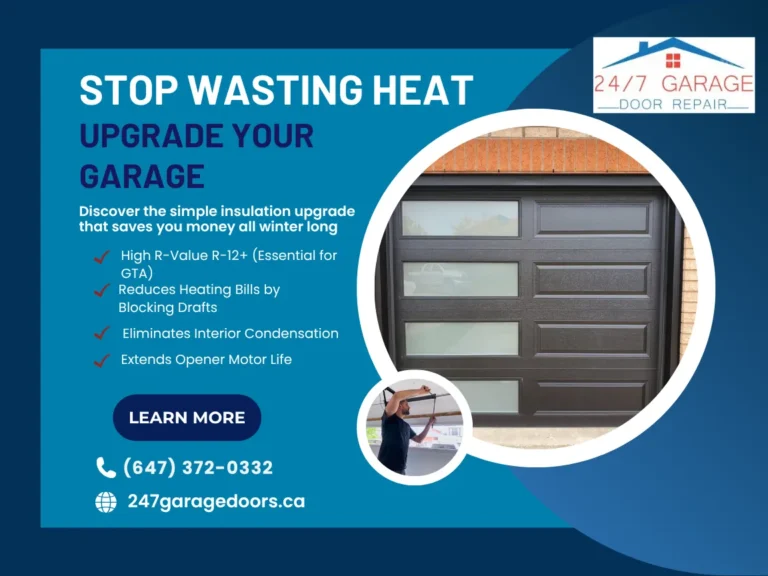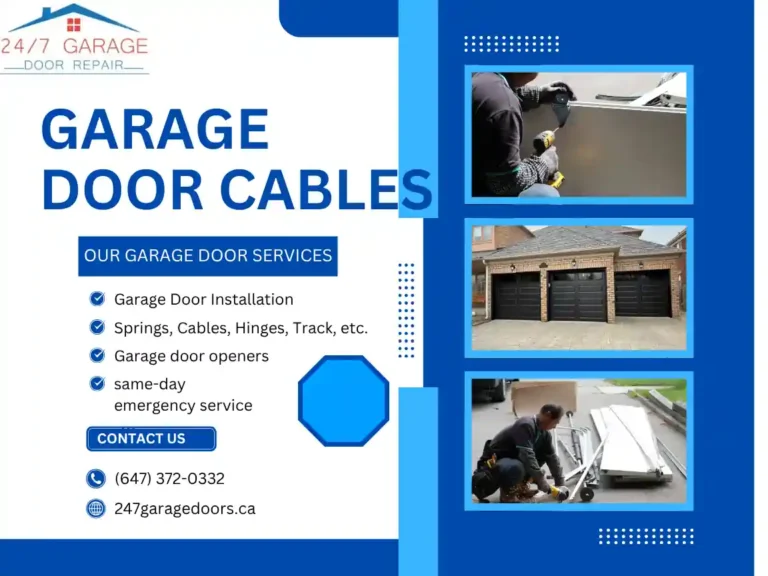Think about your car. You wouldn’t drive it for years without an oil change, tire rotation, or tune-up, would you? The same principle applies to your garage door. It’s likely the largest and heaviest moving part of your home, used multiple times a day, every single day. Yet, for many homeowners, garage door maintenance is often an afterthought – until something goes wrong. And when a garage door fails, it’s not just an inconvenience; it can be a serious safety hazard and lead to expensive emergency repairs.
At 24/7 Garage Doors, we believe that proactive care is the best defense. Investing a little time and effort into garage door maintenance can significantly extend its lifespan, ensure its safe operation, improve its efficiency, and save you considerable money in the long run. This comprehensive guide will walk you through the essential aspects of garage door upkeep, covering both simple DIY checks and when it’s crucial to call in the professionals for professional garage door maintenance service.


Why Garage Door Maintenance Matters: Benefits Beyond the Obvious
Regular garage door maintenance isn’t just about preventing breakdowns; it delivers a multitude of benefits for your home and your wallet:
- Enhanced Safety: This is paramount. Garage doors operate under extreme tension, with springs and cables holding hundreds of pounds of weight. Regular checks ensure that safety mechanisms, like auto-reverse features and photo-eye sensors, are functioning correctly, preventing accidents and injuries. A well-maintained door is a safe door.
- Extended Lifespan of Your System: Just like any mechanical system, wear and tear are inevitable. Lubricating moving parts, tightening loose hardware, and addressing minor issues prevent small problems from escalating into major malfunctions. This significantly extends the life of your garage door, springs, opener, and other components, delaying the need for costly replacements.
- Prevents Costly Repairs: Identifying minor issues early through routine garage door maintenance can save you hundreds, if not thousands, of dollars in emergency repairs. A squeaky roller might need lubrication, but if ignored, it could lead to the door coming off its tracks, requiring an extensive and expensive fix. This is a key benefit of regular garage door maintenance.
- Improved Performance and Efficiency: A well-lubricated and balanced garage door operates smoothly and quietly. It also puts less strain on your opener, potentially leading to lower energy consumption. For insulated garage doors, proper maintenance ensures seals remain intact, maximizing their energy-saving capabilities.
- Maintains Home Security: A malfunctioning or damaged garage door can compromise your home’s security, making it vulnerable to intruders. Regular maintenance ensures your door closes securely, protecting your valuable possessions.
- Reduces Noise Pollution: Tired of a noisy garage door waking up the household or disturbing neighbors? Many irritating sounds (squeaks, grinding, groans) are a direct result of neglected maintenance. Proper lubrication and adjustments can transform a noisy operation into a whisper-quiet one. 🤫
- Preserves Curb Appeal: Your garage door is a significant part of your home’s exterior. Regular cleaning and attention to its condition help maintain its aesthetic appeal, contributing positively to your home’s overall look and value.
Your Essential Garage Door Maintenance Checklist: DIY Tasks
While some tasks absolutely require a professional, there are several simple yet effective garage door maintenance tips you can perform yourself to keep your system in good shape. Aim to do these basic checks at least once a month, with a more thorough inspection every 3-6 months.
- Look and Listen (Monthly):
- Observe Operation: Open and close your garage door several times. Does it move smoothly and evenly? Are both sides moving at the same speed?
- Listen for Sounds: Pay attention to any grinding, scraping, squealing, or popping sounds. Unusual noises often indicate a problem.
- Test the Door’s Balance (Every 6 Months):
- Disconnect Opener: With the door closed, pull the emergency release cord (usually a red handle) to disconnect the opener.
- Manual Lift: Manually lift the door about halfway. It should stay in place without support. If it drifts up or down, your springs are out of balance and require professional adjustment. An unbalanced door puts immense strain on your opener.
- Inspect and Clear the Tracks (Every 3-6 Months):
- Visual Check: Look for any bends, dents, or blockages in the tracks. Use a level to ensure they are perfectly plumb.
- Clean: Wipe down the inside of the tracks with a damp cloth to remove dirt, dust, and solidified grease. DO NOT lubricate the tracks themselves, as this can attract more debris and hinder roller movement.
- Test the Auto-Reverse Safety Features (Monthly):
- Mechanical Test: Place a piece of wood (2×4) or a brick flat on the garage floor in the door’s path. Activate the door to close. When it touches the object, it should immediately stop and reverse.
- Photo-Eye Sensor Test: Wave your hand or an object in front of the photo-eye sensors (located 4-6 inches from the floor on each side of the door) while the door is closing. The door should immediately stop and reverse.
- If your door fails either of these tests, it’s a serious safety hazard. Stop using the door and call a professional immediately for emergency garage door maintenance. For detailed instructions on these crucial safety tests, refer to resources from the Door & Access Systems Manufacturers Association (DASMA).
- Tighten Hardware (Every 6 Months):
- Inspect and Tighten: With a socket wrench and screwdriver, check all nuts, bolts, and screws on hinges, brackets, and the opener mounting. Vibrations from daily use can loosen them over time. Be careful not to overtighten, especially on hinges.
- Inspect Rollers (Annually):
- Look for Wear: Examine the rollers for cracks, chips, flat spots, or excessive wear on the wheel or bearing. Steel rollers might show worn bearings and may look lopsided, while nylon rollers might crack. Worn rollers can cause jerky movement and put extra strain on your system.
- Replacement: If rollers show significant wear, they should be replaced by a professional.
- Check Weatherstripping (Annually):
- Inspect Seals: Examine the rubber seal along the bottom of the door and the weatherstripping around the sides and top. Look for cracks, tears, brittleness, or gaps.
- Replace: Worn weatherstripping reduces your garage’s insulation and allows drafts, water, and pests to enter. Replacement is usually a straightforward DIY task, but professionals can also handle it.
For a comprehensive checklist of DIY tasks, you can consult guides like this one from The Home Depot on garage door maintenance tips.
When to Call the Professionals: Essential Garage Door Tune-Up Services
While DIY checks are valuable, some aspects of garage door maintenance are best left to trained experts. This includes anything involving the springs, cables, or complex opener issues. A professional garage door tune-up service typically includes a thorough, multi-point inspection and precise adjustments that only an expert can safely perform.
Here’s what a professional tune-up from 24/7 Garage Doors typically includes:
- Spring System Inspection and Adjustment: This is crucial. Springs are under extreme tension and are the most dangerous component to work with. Professionals will check for wear, corrosion, and precisely adjust spring tension to ensure the door is perfectly balanced. This prevents premature opener wear and ensures safe manual operation.
- Cable Inspection: Technicians examine cables for fraying, rust, or signs of them coming off the drums.
- Roller and Hinge Inspection/Lubrication: Beyond visual checks, professionals ensure rollers spin freely and hinges operate without binding, applying specialized lubricants.
- Track Alignment: Using proper tools, technicians will verify that tracks are perfectly aligned, plumb, and parallel, correcting any subtle shifts that might impede door movement.
- Opener Inspection and Adjustment: This includes checking the motor, gears, drive system (chain/belt/screw), limit switches, force settings, and electrical connections. They’ll ensure the auto-reverse and photo-eye sensors are calibrated correctly. For a comprehensive check, including your opener’s functions, a professional garage door tune-up service is key.
- Tightening All Hardware: A more thorough tightening of all bolts and fasteners than a typical DIY check.
- Overall System Assessment: Identifying any early signs of wear on any component that could lead to future problems.
| DIY Maintenance | Professional Tune-Up / Repair |
| Visual inspection & listening for sounds | Detailed inspection of all components |
| Testing safety reversal features | Spring tension adjustment & lubrication |
| Cleaning tracks & exterior of the door | Cable inspection & re-attachment |
| Tightening easily accessible bolts | Track alignment & repair of bent sections |
| Replacing remote batteries | Opener force/limit switch adjustments |
| Inspecting weatherstripping for wear | Replacement of worn/damaged springs, cables, rollers, hinges |
| Diagnosing complex electrical or mechanical issues |
How Often Should You Schedule Professional Garage Door Maintenance?
Most experts recommend scheduling professional garage door maintenance service at least once a year. However, if you:
- Use your garage door more than 3-5 times a day.
- Have an older garage door (over 10 years old).
- Live in an area with extreme weather fluctuations (like Canada!).
- Notice any persistent unusual noises or jerky movements.
You might benefit from bi-annual check-ups. Regular upkeep helps mitigate the impact of environmental factors and frequent usage, thereby extending the lifespan of the entire system.
The Cost of Professional Garage Door Maintenance
The cost of professional garage door maintenance is a small investment compared to the potential costs of major repairs or even door replacement due to neglect. A standard garage door tune-up service typically costs between $80 and $180 CAD in Canada. This price usually includes the inspection, lubrication of components, and minor adjustments.
Compare this to the cost of replacing broken springs ($200-$600+), fixing a door off track ($150-$400+), or replacing an entire opener ($300-$700+). Clearly, preventative maintenance offers significant savings. Plus, many manufacturer warranties require proof of annual professional maintenance to remain valid – another reason why the benefits of regular garage door maintenance are so clear. For a general overview of garage door repair costs in Canada, HomeStars provides useful insights.
Choose 24/7 Garage Doors for Your Maintenance Needs
Don’t wait for your garage door to break down before you give it the attention it needs. Regular garage door maintenance is the key to ensuring its safety, functionality, and longevity. It protects your investment, keeps your home secure, and provides peace of mind.
At 24/7 Garage Doors, we provide comprehensive and reliable professional garage door maintenance service. Our certified technicians are experienced with all makes and models of garage doors and openers. We’ll perform a thorough inspection, identify any potential issues, make necessary adjustments, and lubricate all moving parts to keep your garage door operating smoothly and safely year after year.
Don’t let a minor issue become a major headache. For further information on our garage door tune-up services or to book your professional garage door maintenance service, please give 24/7 Garage Doors a call today! Let us help you keep your garage door in peak condition. 📞


